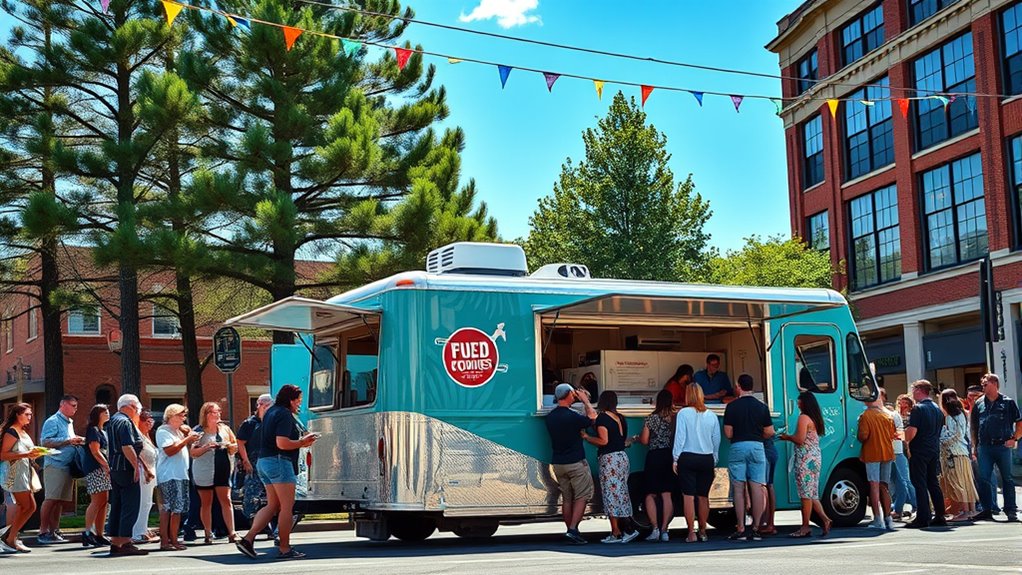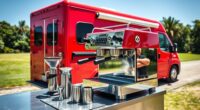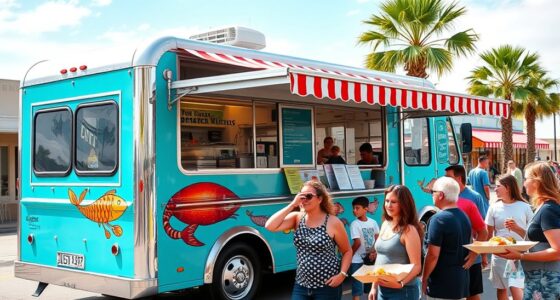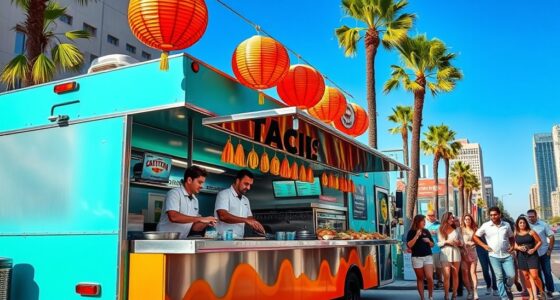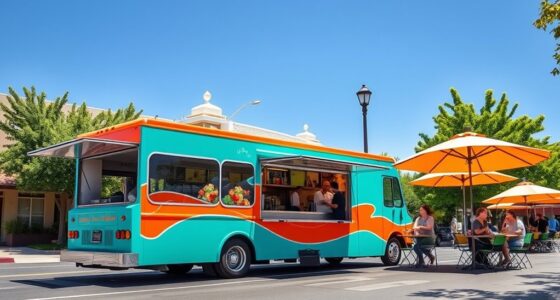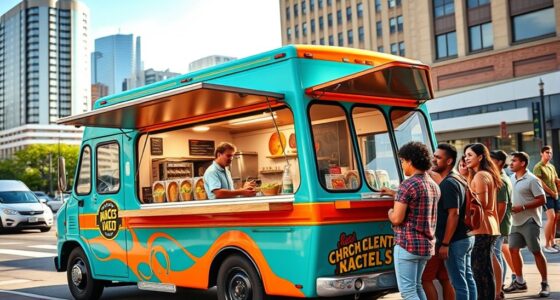To start a food truck in Raleigh, NC, you should first understand the local food scene and participate in community events to build a loyal customer base. Next, familiarize yourself with city regulations, secure permits, and guarantee food safety standards. Set up your operations, budget wisely, and choose the right equipment. Focus on innovative menus and engaging marketing strategies. Keep exploring these steps to guarantee your food truck becomes a community favorite.
Key Takeaways
- Obtain necessary permits and licenses through Raleigh’s online portal and ensure compliance with local health and vendor regulations.
- Develop a unique menu with local ingredients, set competitive prices, and implement contactless payment options for efficiency.
- Engage with Raleigh’s community by participating in local events, festivals, and farmers markets to build brand presence.
- Invest in reliable, compliant kitchen equipment and a suitable vehicle, budgeting for costs like permits, insurance, and startup expenses.
- Build strong branding and active social media marketing to differentiate your food truck and foster customer loyalty.
Starting With Local Food Scene
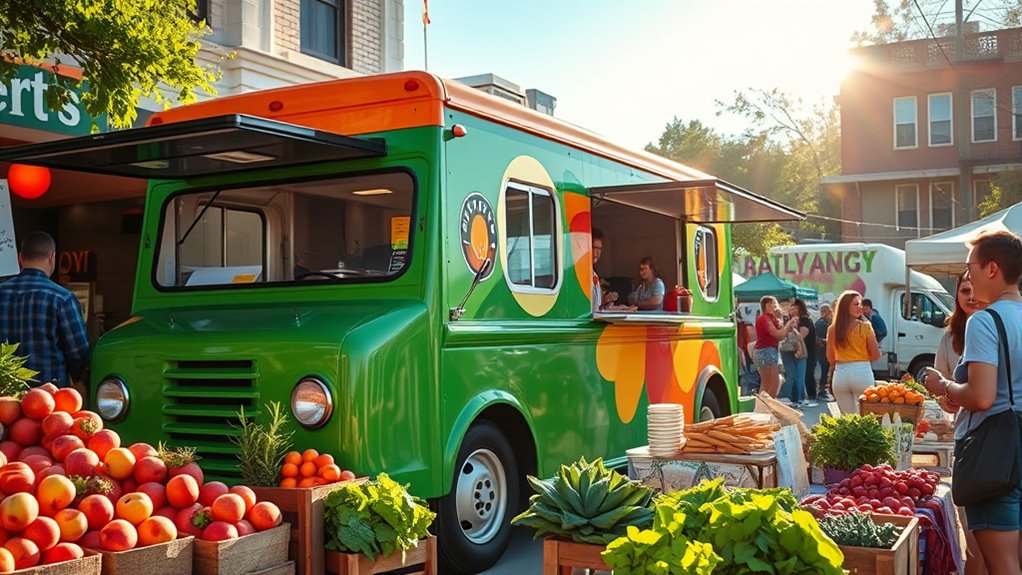
To successfully launch your food truck in Raleigh, it’s essential to immerse yourself in the local food scene. Building strong food truck branding helps you stand out and connect with the community. Attend local food festivals, farmers markets, and events to showcase your offerings and gain exposure. Partnering with other vendors can expand your reach and foster valuable relationships, creating opportunities for cross-promotions. Observe what local customers enjoy and adapt your menu or branding accordingly. Engaging with Raleigh’s vibrant food culture will help you develop a loyal customer base. Remember, authenticity and consistency are key. By immersing yourself in the local scene and forming strategic vendor partnerships, you set a solid foundation for your food truck’s success in Raleigh. Additionally, understanding the local food scene can provide insights into popular flavors and trends that resonate with your target audience.
Understanding Local Requirements
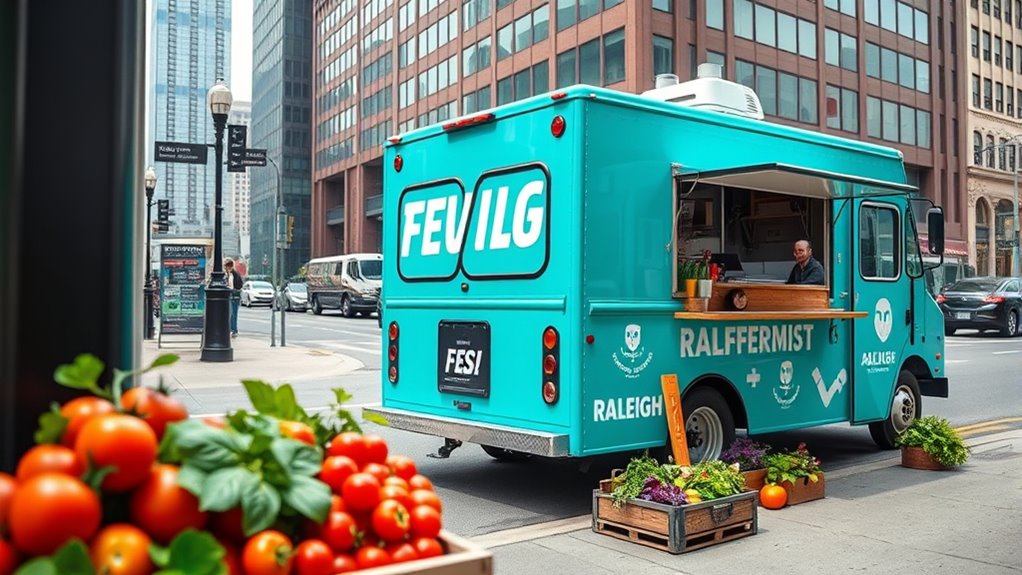
To get started, you’ll need to use the online permit application portal to submit your paperwork and guarantee you meet all requirements. The food safety inspection checklist will guide you through health standards you must follow, while understanding designated vendor zones helps you choose where to operate legally. Make sure you secure the necessary permits for your chosen zones to avoid any compliance issues. Additionally, familiarizing yourself with essential oils for food safety can help promote a healthy environment in your food truck operation.
Online Permit Application Portal
Accessing the online permit application portal is a crucial step in understanding Raleigh’s local requirements for starting a food truck. This portal streamlines the process, allowing you to submit your online permit application efficiently. By using the application portal, you can find detailed instructions, required documents, and checklists specific to Raleigh’s regulations. It also helps you track your application status and receive updates directly. Familiarizing yourself with the portal guarantees you meet all local prerequisites before moving forward. Navigating this system early reduces delays and helps you stay organized. Remember, completing your online permit application thoroughly and accurately is essential to comply with Raleigh’s health and business standards, paving the way for a smooth launch of your food truck venture.
Food Safety Inspection Checklist
Understanding Raleigh’s food safety inspection requirements is essential before launching your food truck. The inspection checklist ensures you meet local standards for food safety, preventing violations that could delay your opening. Familiarize yourself with key areas such as proper food storage, cleanliness, and equipment maintenance. Use this checklist to prepare for your inspection:
| Area | Requirements | Common Violations |
|---|---|---|
| Food Storage | Correct temperatures, labeled containers | Improper refrigeration |
| Equipment Cleanliness | Sanitation of prep surfaces, utensils | Dirty surfaces |
| Personal Hygiene | Handwashing stations, glove use | Lack of handwashing facilities |
| Waste Management | Proper disposal, covered bins | Overflowing trash |
| Pest Control | Sealed food, pest-proof storage | Signs of pests |
Following this inspection checklist helps guarantee your food safety standards are met, making your Raleigh food truck compliant and successful.
Designated Vendor Zones and Permits
Finding your way through Raleigh’s designated vendor zones and permits is essential for legally operating your food truck. Raleigh has specific vendor zones where food trucks can set up, and understanding these locations helps guarantee compliance. To operate legally, you need to obtain the proper food truck permits from local authorities. These permits verify that your truck meets health, safety, and zoning standards. Each vendor zone may have its own rules regarding hours, setup, and permitted food types. Before launching, review the city’s regulations on designated vendor zones and apply for the necessary permits. Staying informed about these requirements helps you avoid fines and penalties, making your food truck business smooth and compliant from day one.
Setting Up Your Base of Operations
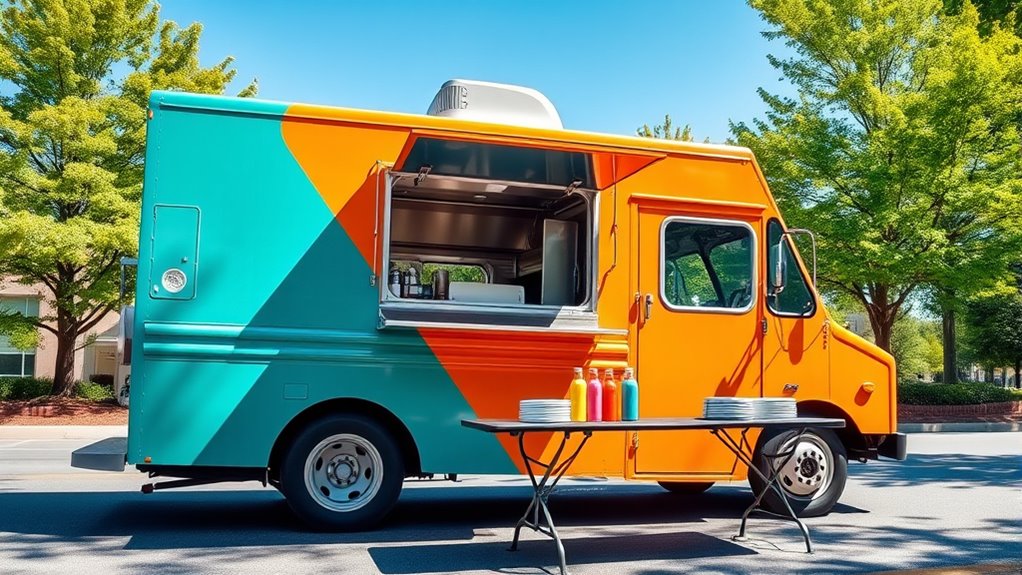
You need a reliable space to prepare your food, so consider shared kitchen licensing requirements in Raleigh. Choosing the right custom kitchen equipment will help you operate efficiently and meet health standards. Ensuring your setup complies with local rules is key to launching smoothly. Incorporating financial management practices such as budgeting and cash flow management into your planning can further ensure your food truck’s sustainable operation.
Shared Kitchen Licensing Requirements
Setting up your base of operations in a shared kitchen requires meeting specific licensing requirements to guarantee compliance with local health and safety standards. First, you’ll need to obtain shared kitchen licensing, which verifies that the facility meets Raleigh’s health codes. Second, securing commercial kitchen permits is essential to operate legally and ensure food safety. To do this, you should:
- Submit your application for shared kitchen licensing through the local health department.
- Pass an inspection to confirm the kitchen complies with sanitation and safety standards.
- Maintain proper documentation and renew permits as required to stay compliant.
These steps help ensure your food truck operates legally and safely, giving you peace of mind and a solid foundation for your business.
Custom Kitchen Equipment Selection
Selecting the right kitchen equipment is a key step in establishing a functional and efficient space for your food truck. Your custom kitchen design hinges on smart equipment selection to meet your menu and operational needs. Focus on versatile appliances like prep stations, ovens, and refrigeration units tailored to your cuisine. Prioritize quality and durability, as equipment in a food truck faces constant movement and use. Consider space-saving options that maximize your limited footprint without sacrificing performance. Proper equipment selection also involves planning for energy efficiency and ease of maintenance. Working with suppliers experienced in custom kitchen setups helps ensure your equipment meets health codes and fits your workflow. Ultimately, thoughtful choices in your equipment selection create a smooth-running kitchen that supports your food truck’s success.
Budgeting and Financing Your Food Truck
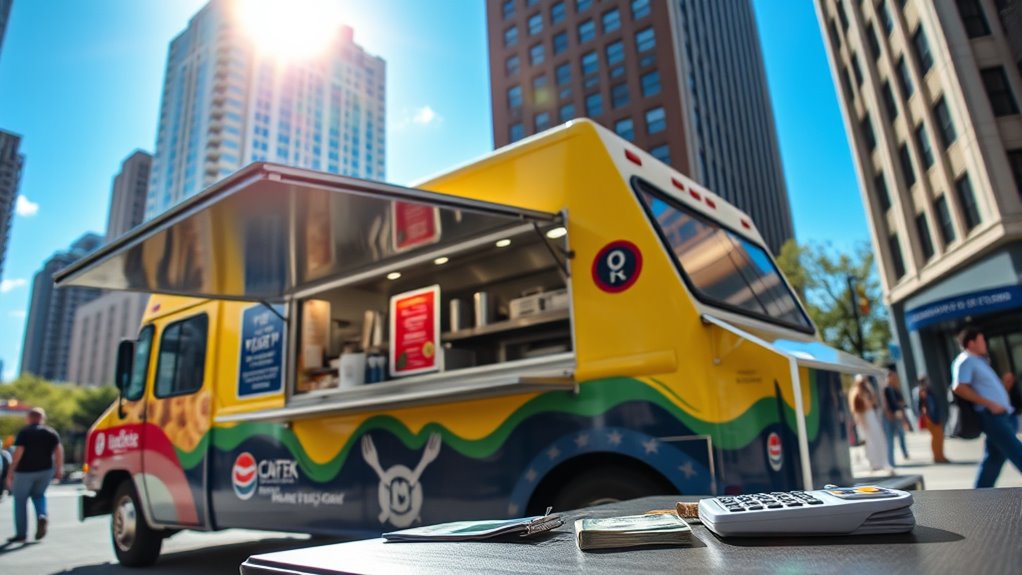
Starting your food truck journey requires understanding your costs, like the initial vehicle purchase and insurance. You should explore options such as small business grants offered by the government to help cover expenses. Additionally, securing liability coverage protects your business and is a vital part of your budget planning. Considering animated movies that touch hearts can also inspire creative branding and marketing ideas for your food truck.
Initial Vehicle Purchase Costs
Are you aware of how much your initial vehicle purchase will cost when starting a food truck in Raleigh? The price varies depending on whether you buy new or used. Typically, you should budget for:
- The truck itself, which can range from $20,000 to $100,000.
- Vehicle registration fees, usually around $100 to $200.
- Insurance costs, which depend on coverage but generally start at $2,000 annually.
Keep in mind, a reliable vehicle is key to your success. Selecting the right truck involves evaluating its condition and suitability for your menu. Remember, higher quality often means higher initial costs but fewer repairs down the road.
Government Small Business Grants
Securing funding is a vital step in launching your food truck, and government small business grants can provide valuable financial support. These grants are a form of government funding designed to help entrepreneurs like you cover startup costs without the burden of repayment. While small business grants are competitive, they can greatly reduce your initial expenses, such as equipment, permits, or marketing. To find eligible grants, research local, state, and federal programs dedicated to small business development. Keep in mind that grant applications often require detailed plans and documentation, so prepare a clear business proposal. Applying successfully can give you a financial boost and credibility, helping you get your food truck off the ground with less financial strain.
Liability Coverage for Food Trucks
Liability coverage is a crucial aspect of budgeting and financing your food truck, as it helps protect your business from costly claims and legal expenses. When selecting liability insurance, make sure you meet the coverage requirements specific to Raleigh, NC, and the food truck industry. This insurance typically covers accidents, property damage, and bodily injuries. To navigate this effectively, keep these points in mind:
- Understand local coverage requirements to avoid fines or denied claims.
- Choose a policy that covers both general liability and vehicle liability.
- Regularly review your policy to adapt to changing business needs and regulations.
Having the right liability insurance safeguards your investment and ensures you’re prepared for unexpected incidents on the road or at events.
Designing Your Menu and Pricing Strategy
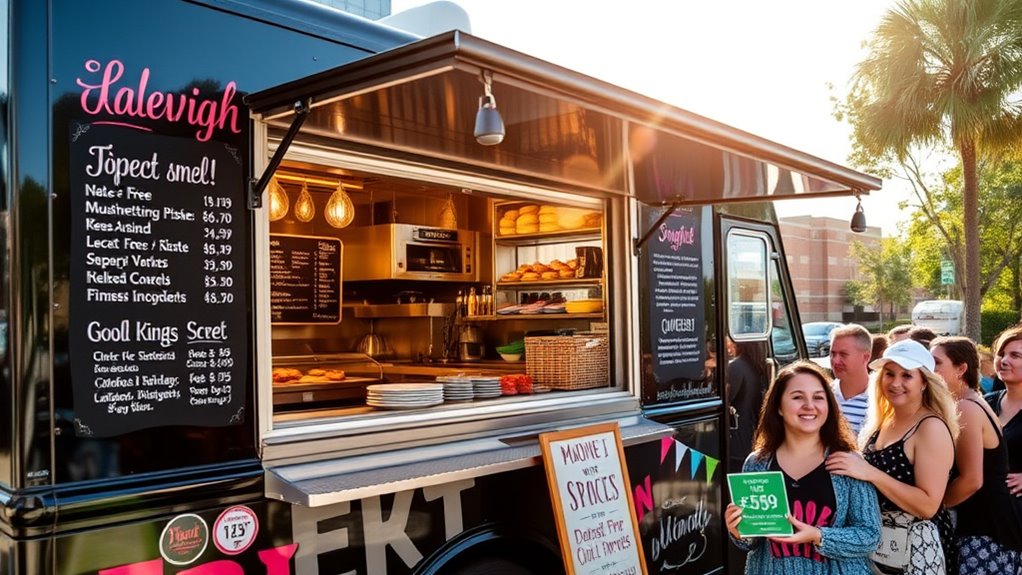
When designing your menu and pricing, focus on sourcing innovative local ingredients to stand out and appeal to Raleigh’s community. Keep portion sizes consistent to control costs and guarantee customer satisfaction, while applying smart markups to maximize profit. Balancing these elements helps create a compelling menu that attracts loyal customers and keeps your business profitable. Additionally, consider implementing transparent pricing strategies to foster trust and encourage repeat business.
Innovative Local Ingredient Sourcing
Incorporating innovative local ingredients into your menu not only sets your food truck apart but also allows you to craft unique dishes that resonate with the Raleigh community. Focus on sustainable sourcing by partnering with nearby farms and vendors committed to eco-friendly practices. Use seasonal ingredients to ensure freshness, flavor, and cost-effectiveness. To maximize impact, consider these strategies:
- Build relationships with local farmers for reliable, seasonal produce.
- Highlight the story of your ingredients to connect with customers.
- Adjust your menu regularly based on ingredient availability and seasonality.
Portion Control and Markup
Designing your menu with precise portion control and smart pricing strategies guarantees you maximize profits while maintaining quality. Proper portion control ensures consistent servings, reducing waste and controlling costs. It helps you keep food costs predictable, making it easier to set competitive prices. When developing your markup strategies, focus on balancing affordability with profit margins. Consider ingredient costs, preparation time, and local market demand to determine ideal price points. Using clear portion sizes also simplifies inventory management and reduces theft or over-serving. By integrating portion control with strategic markup approaches, you can attract customers with fair prices while ensuring your food truck remains financially sustainable. This careful planning allows you to deliver quality meals that satisfy customers and boost your bottom line.
Technology and Operations
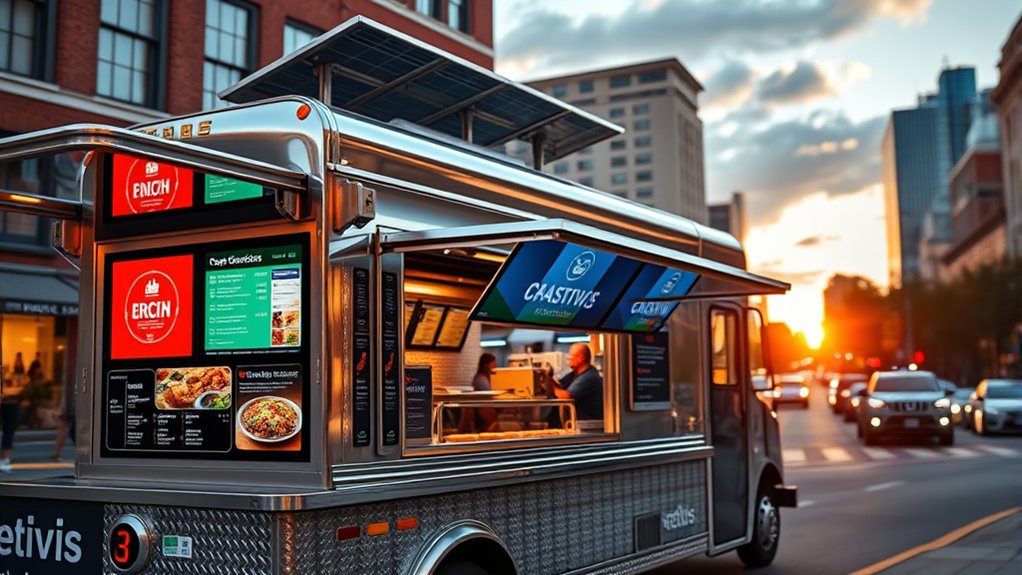
Implementing contactless payment options makes transactions faster and safer for your customers. Using real-time stock tracking software helps you stay on top of inventory and reduce waste. These tech tools streamline operations, so you can focus on serving great food.
Contactless Payment Options Integration
Have you considered how contactless payment options can streamline your food truck’s operations and enhance customer experience? Integrating contactless payments through mobile POS systems makes transactions faster and safer. It reduces wait times and minimizes contact, which customers appreciate. To get started, focus on these key steps:
- Choose a reliable mobile POS system compatible with contactless payments.
- Set up secure payment processing to protect customer data.
- Train your staff on how to use contactless payment features efficiently.
Real-Time Stock Tracking Software
Integrating contactless payments improves checkout speed and safety, but managing inventory efficiently is equally important for smooth operations. Real-time stock tracking software helps you do just that by providing instant updates on your inventory levels. With accurate inventory management, you can avoid stockouts or overstocking, saving money and reducing waste. This technology also enhances sales forecasting, allowing you to predict demand based on current sales trends. By analyzing real-time data, you can make smarter purchasing decisions, ensuring you have the right ingredients at the right time. Implementing stock tracking software streamlines operations and keeps your food truck running smoothly. It empowers you to respond quickly to changes in customer preferences and seasonal fluctuations, boosting your overall efficiency.
Marketing and Growing Your Presence
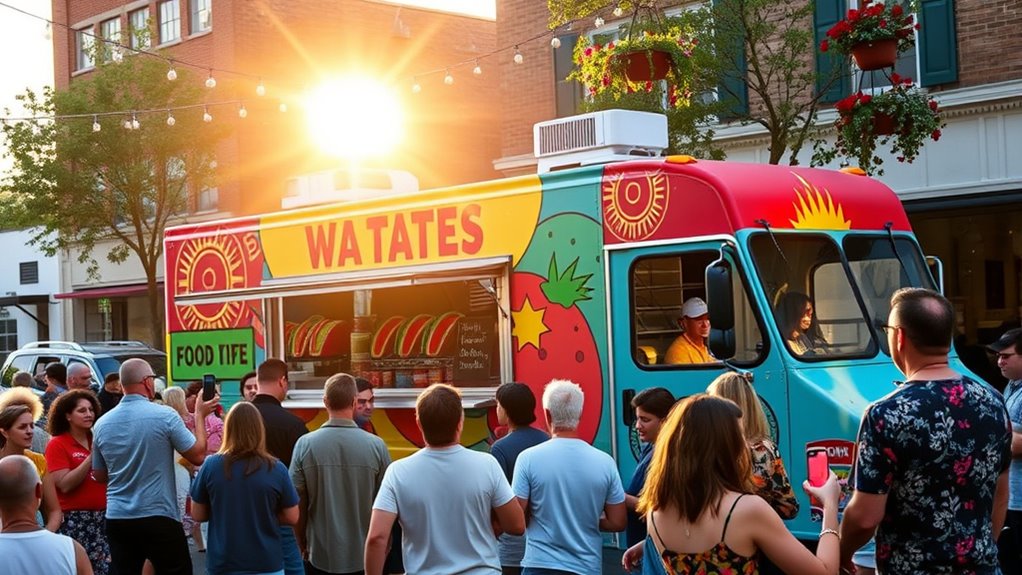
To grow your food truck’s presence in Raleigh, NC, you should focus on connecting with popular local event venues and community events. Offering loyalty programs can keep customers coming back, while participating in neighborhood gatherings boosts your visibility. These strategies will help you build a loyal customer base and expand your reach effectively.
Popular Local Event Venues
Partnering with popular local event venues is one of the most effective ways to boost your food truck’s visibility in Raleigh. These venues attract diverse crowds, giving you opportunities to showcase your unique offerings. To stand out, focus on three key strategies:
- Use local ingredient sourcing to create fresh, authentic flavors that resonate with Raleigh’s community.
- Innovate your menu regularly to keep customers excited and coming back for new tastes.
- Collaborate with event organizers to tailor menus for specific themes or seasonal events.
Loyalty Programs and Community Events
Implementing a loyalty program and participating in community events are powerful ways to grow your food truck‘s presence in Raleigh. A well-designed loyalty program encourages repeat business by rewarding customer loyalty, making customers more likely to choose your truck over competitors. Offer punch cards or digital rewards to keep it simple and engaging. Additionally, getting involved in local community events boosts your visibility and fosters community engagement. Attend festivals, farmers markets, or charity events to connect directly with residents. These activities not only increase your customer base but also build strong relationships within Raleigh’s vibrant food scene. By combining loyalty initiatives with active community participation, you’ll establish your food truck as a trusted and integral part of the local community.
Navigating Raleigh’s Vibrant Food Scene
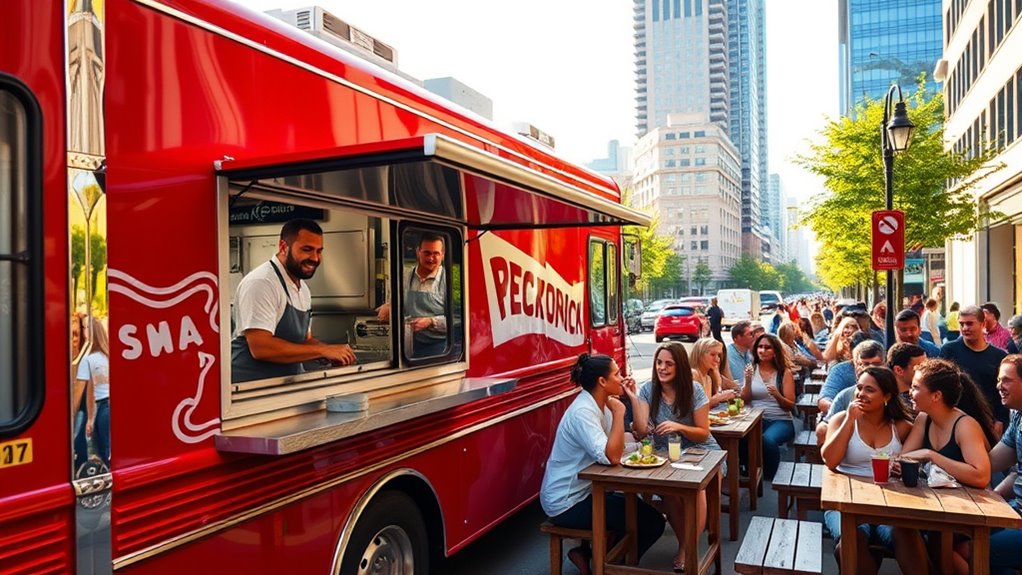
Raleigh’s food scene pulses with energy, offering a diverse array of culinary experiences that attract locals and visitors alike. To stand out, focus on strong food truck branding that reflects your unique style. Use social media marketing effectively to build buzz and connect with your audience. Keep these tips in mind:
Stand out in Raleigh’s vibrant food scene with strong branding and engaging social media presence.
- Develop a memorable logo and cohesive branding across all platforms.
- Post consistently, sharing behind-the-scenes content and special menu items.
- Engage with followers through comments and promotions to foster loyalty.
Frequently Asked Questions
What Permits Are Required for Food Trucks in Raleigh?
You need to obtain several food truck permits to operate in Raleigh. First, apply for a food service permit through the Raleigh Health Department, ensuring your truck meets safety standards. You’ll also need a mobile food vending permit, a city business license, and possibly parking permits based on Raleigh regulations. Make sure to check with local authorities for any additional requirements to stay compliant and avoid penalties.
How Do I Find the Best Locations for My Food Truck?
Like a savvy detective, you should analyze your competitors’ locations and customer flow. Check parking regulations to make certain spots are legal and accessible, avoiding no-parking zones. Visit popular areas during peak hours, such as festivals or downtown events, to gauge foot traffic. Use social media and local insights to identify high-traffic spots. Combining competitor analysis with parking rules helps you find the best spots to serve hungry customers and grow your food truck biz.
Are There Specific Health Codes I Need to Follow?
Yes, you need to follow specific health codes when operating your food truck in Raleigh, NC. You’ll must adhere to food safety regulations and pass health inspection procedures mandated by local health authorities. These include proper food handling, sanitation, and storage practices. Make sure you stay updated on any changes in regulations by regularly checking with Raleigh’s health department, and always keep your truck clean and compliant to avoid fines or closures.
What Insurance Coverage Is Mandatory for Food Trucks?
Ever wondered what protects your food truck business? You must have liability insurance to cover accidents and damages, along with vehicle insurance for your truck. Don’t forget to get workers’ comp if you have employees. Strong food truck branding and social media marketing help attract customers, but insurance keeps your business safe. Are you prepared to safeguard your passion and investments? Make sure you’re covered before hitting the streets!
How Can I Build a Loyal Customer Base Quickly?
To build a loyal customer base quickly, focus on active customer engagement and use social media to your advantage. Share vibrant photos of your dishes, promote special offers, and respond promptly to customer comments. Attend local events and encourage satisfied customers to spread the word. Consistently providing excellent service and engaging online helps create a community around your food truck, turning first-time visitors into regular patrons.
Conclusion
Starting a food truck in Raleigh is an exciting journey that puts you at the heart of a thriving culinary scene. By understanding local requirements, crafting a standout menu, and embracing innovative marketing, you can turn your passion into a bustling business. With dedication and a bit of luck, your food truck could become as iconic as Raleigh’s skyline itself, serving up unforgettable experiences that leave a lasting impression on every customer you serve.
